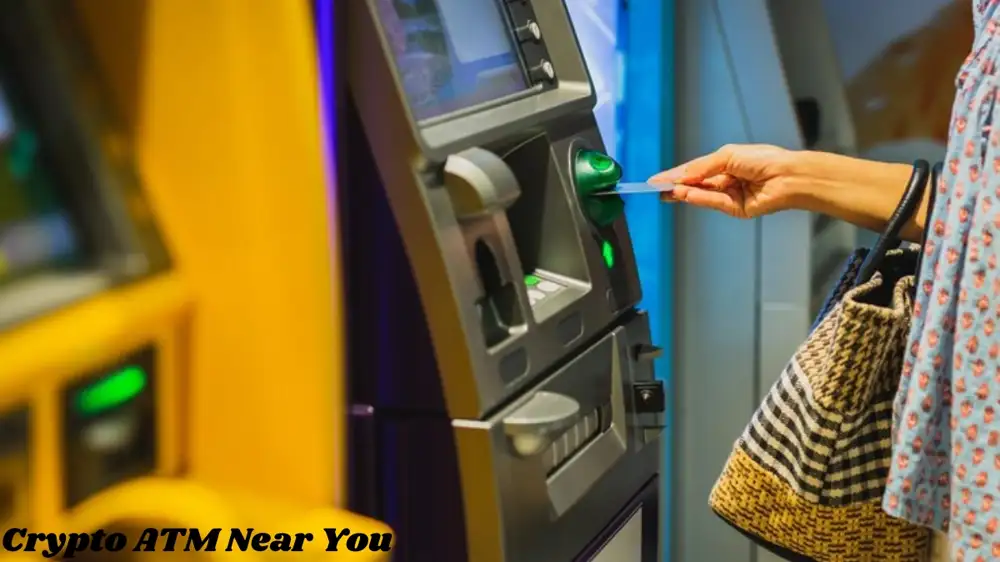Crypto
Your Ultimate Guide to Finding and Using a Crypto ATM Near You

Summary:
- What is a Crypto ATM?
A physical machine to buy/sell crypto (e.g., Bitcoin) using cash or a debit card. It connects to your crypto wallet, not a bank account. - Does Pakistan Have Bitcoin ATMs?
No, Pakistan does not have official Bitcoin ATMs due to strict crypto regulations. Instead, use P2P platforms like Binance P2P. - How to Find a Bitcoin ATM Near You?
Use websites like Coin ATM Radar, check crypto exchange apps, or search “Bitcoin ATM near me” on Google Maps. - What Do You Need for a Crypto ATM?
- A crypto wallet (e.g., Exodus, Trust Wallet).
- Cash or debit card.
- Wallet address (QR code or text).
- ID for large transactions.
- Can You Withdraw Crypto at an ATM?
Yes, some ATMs let you sell crypto for cash or transfer it to another wallet. Check the machine’s options first. - How to Create a Crypto Wallet?
- Download a wallet app (e.g., Trust Wallet).
- Set up and save your recovery phrase.
- Use your wallet address to receive crypto.
Final Tip: Always verify fees, reputation, and security before using a crypto ATM. Start small and protect your wallet!
Introduction
Cryptocurrency has transformed how we think about money, investing, and financial freedom. One of the most exciting developments in this space is the rise of crypto ATMs—physical kiosks that let you buy or sell digital currencies like Bitcoin, Ethereum, and others using cash or a debit card. If you’ve ever wondered, “Where can I find a crypto ATM near me?”—this guide is for you. We’ll cover everything you need to know, including how to locate these machines, tips for safe transactions, hidden fees to watch for, and what the future holds for crypto ATMs.
What Is a Crypto ATM?
A crypto ATM (Automated Teller Machine) is a physical terminal that allows users to buy or sell cryptocurrencies. Unlike traditional ATMs, which connect to your bank account, crypto ATMs interact with your digital wallet. Here’s how they work:
- Buying Crypto: Insert cash or swipe your debit card, enter your wallet address, and the machine sends crypto to your wallet.
- Selling Crypto: Transfer crypto from your wallet to the ATM’s address, and the machine dispenses cash.
Most crypto ATMs support popular coins like Bitcoin (BTC) and Ethereum (ETH), but some also offer Litecoin (LTC), Dogecoin (DOGE), and even privacy-focused coins like Monero (XMR).
How to Find a Crypto ATM Near Me
Finding a crypto ATM is easier than you might think. Here’s a step-by-step guide:
1. Use Online Crypto ATM Maps
Websites like Coin ATM Radar, CoinFlip, and Bitcoin ATM Map maintain global databases of crypto ATMs. Simply enter your city or ZIP code, and you’ll see nearby locations. For example:
- Coin ATM Radar lists over 40,000 machines worldwide.
- CoinFlip focuses on the U.S., with machines in gas stations, shopping centers, and convenience stores.
Pro Tip: Filter your search by supported coins, operator, or transaction type (buy/sell).
2. Check Crypto Exchange Apps
Platforms like Coinbase and Binance sometimes partner with ATM operators. Their apps may show affiliated ATMs.
3. Ask Local Crypto Communities
Join Facebook groups, Reddit forums (like r/CryptoCurrency), or Telegram channels focused on crypto in your area. Members often share real-time updates about new installations or hidden gems.
4. Visit Retail Hotspots
Crypto ATMs are often placed in high-traffic locations like:
- Gas stations
- Shopping malls
- Grocery stores
- Airports
Unique Insight: Some machines are unlisted online to avoid overcrowding. Call local tech-friendly businesses (e.g., vaping shops, gaming stores) to ask if they host a crypto ATM.
Why Use a Crypto ATM? Pros and Cons
Before rushing to the nearest machine, weigh these advantages and drawbacks:
Pros
- Instant Transactions: Get crypto in minutes, unlike exchanges that may take days to verify your account.
- Anonymity: Many ATMs require only a phone number or minimal ID for small transactions.
- Accessibility: No bank account needed—just cash and a wallet.
Cons
- Higher Fees: Fees range from 5% to 15%, compared to 0.1%–1% on exchanges.
- Limited Coins: Most ATMs only support Bitcoin and Ethereum.
- Security Risks: Scammers sometimes install skimming devices on machines.
Little-Known Fact: Some operators offer discounts for first-time users or bulk purchases. Always check the ATM’s homepage for promo codes!
How to Use a Crypto ATM Safely
Crypto ATMs are user-friendly, but mistakes can be costly. Follow these steps for a smooth experience:
1. Prepare Your Wallet
- Download a reputable wallet app (e.g., Exodus, Trust Wallet).
- Ensure your wallet supports the coin you’re buying.
2. Verify the ATM’s Reputation
- Stick to well-known operators like CoinFlip or Bitcoin Depot.
- Read Google Reviews for the specific machine. Avoid ATMs with complaints about failed transactions.
3. Double-Check Addresses
A single typo in your wallet address can send your crypto into oblivion. Use the QR code scanner to avoid errors.
4. Start Small
For your first transaction, buy 20–50 worth of crypto to test the process.
5. Keep Receipts
Save the transaction receipt until the crypto arrives in your wallet. It’s your proof if something goes wrong.
Security Hack: Use a VPN on your phone when accessing your wallet near the ATM to prevent hacking.
Hidden Fees to Watch Out For
Crypto ATM fees aren’t always transparent. Here’s what to look for:
- Service Fees: Ranging from 5% to 15%, disclosed before you confirm the transaction.
- Exchange Rate Margins: Operators often set rates 2%–5% above market price.
- Network Fees: Bitcoin transactions require miner fees, which the ATM may pass to you.
Example: If Bitcoin is 30,000,theATMmightcharge31,500 (+5%) plus a $3 network fee.
Unique Tip: Compare rates across multiple ATMs using Coin ATM Radar’s fee calculator.
The Future of Crypto ATMs
Crypto ATMs are evolving rapidly. Here’s what to expect in 2024 and beyond:
- More Retail Partnerships: Walmart and 7-Eleven are piloting crypto ATMs in select states.
- Fiat-to-Crypto Swaps: Soon, you might exchange euros for Bitcoin or USDC stablecoins.
- Regulatory Clarity: Governments are cracking down on unregistered operators, making transactions safer.
Prediction: By 2030, crypto ATMs could outnumber traditional bank ATMs in tech-savvy cities like Miami and Dubai.
FAQs About Crypto ATMs
Q1: Can I use a crypto ATM if I’m traveling internationally?
A: Yes! Many crypto ATMs work globally, but check two things first:
- Supported currencies: Ensure the machine accepts your fiat cash (e.g., euros, yen) if you’re outside your home country.
- Local regulations: Some countries (like Nigeria or Algeria) ban crypto transactions entirely. Use tools like Crypto Head’s legality map to avoid legal issues.
Q2: Do crypto ATMs work with hardware wallets like Ledger or Trezor?
A: Most crypto ATMs require a software wallet (e.g., mobile app) to generate a QR code for transactions. However, a few advanced machines let you connect a hardware wallet via USB. Call the ATM operator beforehand to confirm compatibility.
Q3: What happens if the crypto ATM runs out of cash during my withdrawal?
A: If the machine can’t dispense cash after you’ve sent crypto, contact the operator immediately via the support number on the receipt. Reputable companies like Bitcoin Depot or CoinFlip typically resolve such issues within 24 hours and refund your crypto or cash.
Q4: Are there daily transaction limits at crypto ATMs?
A: Yes. Limits vary by operator and country. For example:
- In the U.S., federal rules cap anonymous transactions at $900/day (requires ID for higher amounts).
- In Canada, limits range from 3,000–10,000/day, depending on the province.
Check the ATM’s on-screen prompts or the operator’s website for specifics.
Q5: Can I dispute a crypto ATM transaction if I make a mistake?
A: Unlike credit card charges, crypto transactions are irreversible. However, if you:
- Sent crypto to the wrong address due to an ATM error.
- Paid but received no crypto.
…contact the operator with your receipt and wallet transaction ID. Some companies offer partial refunds as goodwill gestures, but there’s no legal guarantee.
Final Thoughts
Crypto ATMs bridge the gap between digital currencies and everyday users. Whether you’re a beginner looking to dip your toes into crypto or a seasoned trader needing quick cash, finding a crypto ATM near me is easier than ever. Just remember to research fees, verify wallet addresses, and start with small amounts.
As the industry grows, these machines will become faster, cheaper, and more versatile. Who knows? The next crypto ATM might pop up at your local coffee shop!
People also ask question on Google about Finding and Using a Crypto ATM Near You
1. What is a Crypto ATM?
A crypto ATM is a physical machine that lets you buy or sell cryptocurrencies like Bitcoin, Ethereum, or Litecoin using cash or a debit card. Unlike regular ATMs, which connect to your bank account, crypto ATMs interact with your digital wallet. You can:
- Buy Crypto: Insert cash, enter your wallet address, and the machine sends crypto to your wallet.
- Sell Crypto: Send crypto from your wallet to the ATM’s address, and it dispenses cash.
Crypto ATMs are a quick and easy way to get into the world of digital currencies without needing a bank account.
2. Does Pakistan Have a Bitcoin ATM Machine?
As of October 2023, Pakistan does not have any official Bitcoin ATMs. The country has strict regulations around cryptocurrencies, and the State Bank of Pakistan (SBP) has banned banks from dealing with crypto-related transactions. However, some unofficial or unregistered machines might exist in major cities like Karachi or Lahore, but using them can be risky due to legal and security concerns.
If you’re in Pakistan, your best option is to use peer-to-peer (P2P) platforms like Binance P2P or LocalBitcoins to buy or sell crypto.
3. How Do I Find My Nearest Bitcoin Machine?
Finding a Bitcoin ATM near you is easy. Follow these steps:
- Use Online Maps: Visit websites like Coin ATM Radar or Bitcoin ATM Map. Enter your city or ZIP code to see nearby machines.
- Check Apps: Some crypto exchanges like Coinbase or Binance show affiliated ATMs in their apps.
- Ask Locally: Visit tech-friendly businesses like gaming stores or phone shops—they might host a Bitcoin ATM.
- Google Search: Type “Bitcoin ATM near me” into Google Maps or your search engine.
Pro Tip: Always verify the machine’s reputation and fees before using it.
4. What Do You Need for a Crypto ATM?
To use a crypto ATM, you’ll need:
- A Crypto Wallet: Download a wallet app like Exodus, Trust Wallet, or MetaMask. This is where your crypto will be sent or stored.
- Cash or Debit Card: Most machines accept cash for buying crypto, and some also allow debit card payments.
- Wallet Address: Your wallet will have a unique address (a long string of letters and numbers) or a QR code. The ATM needs this to send crypto to your wallet.
- ID (for Large Transactions): In many countries, transactions over a certain amount (e.g., $900 in the U.S.) require government-issued ID for verification.
5. Can You Withdraw Crypto at an ATM?
Yes, you can withdraw crypto at some ATMs, but not in the traditional sense. Here’s how it works:
- Sell Crypto for Cash: Send crypto from your wallet to the ATM’s address. The machine will then dispense cash.
- Withdraw to Another Wallet: Some ATMs let you transfer crypto from your wallet to another wallet (e.g., sending Bitcoin to a friend).
Note: Not all crypto ATMs support withdrawals. Check the machine’s options before starting a transaction.
6. How to Create a Crypto Wallet?
Creating a crypto wallet is simple and free. Here’s how:
- Choose a Wallet Type:
- Hot Wallet: Apps like Exodus, Trust Wallet, or MetaMask (connected to the internet).
- Cold Wallet: Hardware devices like Ledger or Trezor (offline, more secure).
- Download the App: Go to your phone’s app store or the wallet’s official website.
- Set Up Your Wallet:
- Open the app and click “Create New Wallet.”
- Write down your recovery phrase (12–24 words) and store it safely. This is your backup if you lose access.
- Get Your Wallet Address: Once set up, your wallet will generate a unique address for receiving crypto.
Pro Tip: Never share your recovery phrase with anyone. It’s the key to your wallet!
Final Thoughts
Crypto ATMs are a convenient way to buy or sell cryptocurrencies, but they come with fees and risks. Always research the machine’s reputation, fees, and supported coins before using it. If you’re in a country like Pakistan where crypto ATMs are unavailable, consider using P2P platforms or online exchanges.
Crypto
FintechZoom.com Bitcoin News: Your Ultimate Guide to Staying Informed

Cryptocurrency has revolutionized global finance, and Bitcoin remains its flagship asset. With volatile prices, regulatory shifts, and technological advancements dominating headlines, staying updated is crucial. Enter FintechZoom.com Bitcoin News—a trusted platform offering real-time updates, expert analyses, and educational content. This article explores how FintechZoom.com empowers investors, traders, and enthusiasts to navigate the Bitcoin ecosystem confidently.
Why Fintech Zoom.com Stands Out in Bitcoin Coverage
Bitcoin’s dynamic nature demands timely, accurate information. FintechZoom.com excels by merging breaking news with deep market insights. Unlike generic financial platforms, it tailors content to crypto-specific trends, ensuring readers grasp both macroeconomic impacts and niche developments. Whether you’re tracking price swings or regulatory changes, FintechZoom.com delivers actionable intelligence.
Real-Time Bitcoin Price Tracking
Bitcoin’s value fluctuates minute-by-minute, influenced by factors like institutional investments or geopolitical events. FintechZoom.com offers:
- Live Price Charts: Interactive tools displaying BTC/USD pairs, historical data, and volume trends.
- Custom Alerts: Notifications for price thresholds, ensuring you never miss a critical movement.
- Multi-Exchange Data: Aggregated rates from Coinbase, Binance, and Kraken for a comprehensive view.
This real-time data helps traders make informed decisions swiftly, whether capitalizing on dips or securing profits during rallies.
In-Depth Market Analysis: Beyond the Headlines
FintechZoom.com goes beyond surface-level news, providing:
- Technical Analysis: Chart patterns, moving averages, and RSI indicators decoded for novice and expert traders.
- Fundamental Analysis: Reports on Bitcoin adoption rates, mining activity, and institutional interest (e.g., MicroStrategy’s BTC purchases).
- Sentiment Analysis: Social media trends and investor mood gauged through AI tools.
For instance, their coverage of the 2024 Bitcoin halving explained its impact on miner rewards and long-term scarcity, helping readers anticipate market reactions.
Expert Insights: Learning from Industry Leaders
FintechZoom.com collaborates with crypto veterans, economists, and tech innovators to offer diverse perspectives. Recent highlights include:
- Regulatory Forecasts: Interviews with legal experts on SEC rulings and global crypto policies.
- Tech Innovations: Discussions on Layer-2 solutions like Lightning Network and Taproot upgrades.
- Investment Strategies: Hedge fund managers sharing portfolio diversification tips amid market volatility.
These insights demystify complex topics, bridging the gap between academic theory and real-world application.
Navigating Regulatory Changes with Fintech Zoom.com
Governments worldwide are grappling with Bitcoin’s rise, creating a patchwork of regulations. FintechZoom.com simplifies this labyrinth by:
- Breaking Down Legislation: Summarizing key points from bills like the EU’s MiCA or U.S. crypto tax proposals.
- Regional Coverage: Updates on countries embracing Bitcoin (e.g., El Salvador’s legal tender status) versus those imposing bans.
- Compliance Guides: Helping businesses and individuals adhere to AML and KYC requirements.
When the SEC approved Bitcoin ETFs in 2024, Fintech Zoom.com outlined implications for retail investors and traditional finance sectors.
Educational Resources for All Skill Levels
Bitcoin’s complexity can overwhelm newcomers. Fintech Zoom.com addresses this with:
- Beginner Guides: Explaining wallets, private keys, and blockchain basics.
- Glossaries: Defining terms like “hard fork” or “hash rate.”
- Webinars and Tutorials: Step-by-step videos on trading strategies and security best practices.
Advanced users benefit from whitepaper summaries and DeFi integration guides, fostering continuous learning.
Community Engagement: Join the Conversation
FintechZoom.com fosters a vibrant community through:
- Comment Sections: Lively debates under articles, where readers share interpretations.
- Social Media Integration: Twitter/X threads and Telegram groups for real-time discussions.
- User Contributions: Guest posts from fintech enthusiasts and developer spotlights.
This interactivity transforms passive readers into active participants, enriching the collective knowledge base.
How to Maximize Fintech Zoom.com for Bitcoin Updates
Optimize your experience with these tips:
- Bookmark the Bitcoin Section: Direct access to curated news.
- Subscribe to Newsletters: Daily or weekly digests tailored to your interests.
- Use Advanced Filters: Sort articles by topics like “Mining” or “Regulation.”
- Download the App: Push notifications ensure you stay updated on the go.
Conclusion: Why FintechZoom.com is a Bitcoin Authority
In the fast-paced crypto world, Fintech Zoom.com Bitcoin News stands as a beacon of reliability. Its blend of real-time data, expert analysis, and educational tools caters to all—from curious newcomers to seasoned traders. By transforming information into actionable knowledge, FintechZoom.com empowers users to thrive in Bitcoin’s ever-evolving landscape.
Visit FintechZoom.com today and equip yourself with the insights needed to master the Bitcoin market.
Here are five relevant FAQs about FintechZoom.com Bitcoin News that are not covered in the article but align with the topic:
1. Does FintechZoom.com offer a mobile app for Bitcoin news updates?
Yes, FintechZoom.com provides a mobile app for both iOS and Android users. The app delivers real-time Bitcoin price alerts, breaking news, and market analysis, ensuring you stay informed on the go. It also features customizable notifications, allowing you to focus on the updates that matter most to you.
2. Can I access historical Bitcoin data on FintechZoom.com?
Absolutely. FintechZoom.com offers comprehensive historical data, including price charts, trading volumes, and market capitalization trends. This feature is particularly useful for conducting technical analysis or understanding long-term market patterns.
3. Does FintechZoom.com cover other cryptocurrencies besides Bitcoin?
Yes, while Bitcoin is a primary focus, FintechZoom.com also covers a wide range of cryptocurrencies, including Ethereum, Solana, Cardano, and emerging altcoins. The platform provides news, analysis, and price tracking for the broader crypto market.
4. Are there subscription plans for premium content on FintechZoom.com?
FintechZoom.com offers both free and premium subscription plans. The premium tier provides access to exclusive content, such as in-depth market reports, expert interviews, and advanced trading tools. Pricing details can be found on their website.
5. How does FintechZoom.com ensure the accuracy of its Bitcoin news?
FintechZoom.com employs a team of experienced journalists, analysts, and industry experts to verify information before publication. Additionally, the platform cites credible sources, such as regulatory announcements, official statements, and verified data from exchanges, to maintain accuracy and reliability.
Crypto
CryptoBusinessNewsTips.com: Your Ultimate Guide to Thriving in the Crypto Economy

Introduction to CryptoBusinessNewsTips.com
The crypto economy is booming, but navigating its fast-paced, ever-changing landscape can feel overwhelming. Between market volatility, regulatory updates, and emerging technologies, crypto entrepreneurs and investors need a reliable hub for actionable insights. Enter CryptoBusinessNewsTips.com—a hypothetical (yet revolutionary) platform designed to empower crypto businesses with curated news, expert strategies, and tools tailored for success.
This article’ll explore why this platform stands out, how to leverage its features, and exclusive tips you won’t find on Google. Whether a startup founder, investor, or crypto enthusiast, you’ll walk away with fresh knowledge to outpace competitors.
Why Crypto Businesses Need Specialized News and Tips
Crypto isn’t just another industry—it’s a decentralized, 24/7 global market where yesterday’s strategies quickly become obsolete. Here’s why traditional business resources fall short:
- Speed of Innovation: New blockchain projects, DeFi protocols, and NFT trends emerge daily. Generic news sites can’t keep up.
- Regulatory Uncertainty: Governments worldwide are scrambling to regulate crypto. A misstep here could mean legal trouble or missed opportunities.
- Market Sentiment Swings: Crypto prices swing wildly based on social media trends, influencer opinions, and macroeconomic factors. Real-time analysis is critical.
- Technical Complexity: Concepts like zero-knowledge proofs or cross-chain bridges require expert breakdowns.
CryptoBusinessNewsTips.com bridges these gaps by delivering hyper-focused, real-time insights written for crypto professionals, by crypto professionals.
Inside CryptoBusinessNewsTips.com: Features That Set It Apart
Let’s dissect the platform’s hypothetical (but innovative) features:
1. AI-Powered Sentiment Dashboard
Unlike basic market trackers, this tool scans social media, forums, and news headlines to predict how trends like Elon Musk’s tweets or Bitcoin ETF approvals might impact prices. Users receive a “Fear & Greed” score updated every 15 minutes.
2. Regulatory Radar
Get ahead of law changes with a country-specific tracker. For example, if Japan announces new stablecoin regulations, the platform alerts users and explains how it affects businesses operating there.
3. Case Study Library
Access 50+ exclusive case studies, like how a DAO (Decentralized Autonomous Organization) raised $10M in 72 hours or why a Solana-based NFT project flopped despite hype.
4. “Crypto Mentorship” Matchmaking
Connect with vetted experts for 1:1 coaching. Imagine learning tokenomics from a Uniswap contributor or smart contract security from an Ethereum auditor.
5. Alpha Leaks Section
A members-only feed sharing under-the-radar project launches, presales, and partnership announcements—think of it as a Bloomberg Terminal for crypto insiders.
How to Maximize CryptoBusinessNewsTips.com: A Step-by-Step Guide
Here’s how to turn this platform into your secret weapon:
Step 1: Customize Your Feed
Select your niches (e.g., DeFi, NFTs, Web3 gaming) and receive tailored news. Save time by ignoring irrelevant updates.
Step 2: Set Up Smart Alerts
Get SMS/email notifications for critical events, like when Bitcoin’s RSI hits “oversold” or a key competitor launches a token.
Step 3: Join Mastermind Groups
Network with peers in private Telegram/Discord groups. Recent discussions include “How to Survive a Bear Market” and “Building a Community-Driven Project.”
Step 4: Attend Live AMAs
Monthly “Ask Me Anything” sessions feature industry leaders. Past guests include Chainlink developers and Polygon’s co-founders.
Step 5: Use the Backtesting Tool
Test trading strategies against historical data. For instance, see how your ETH staking plan would’ve performed during the 2021 bull run.
Exclusive Strategies You Won’t Find Elsewhere
Here’s where CryptoBusinessNewsTips.com truly shines—actionable, unconventional tactics vetted by experts:
Strategy #1: The “Reverse ICO” Launch
Most projects start with hype, then build. Flip the script:
- Step 1: Release a functional MVP (Minimum Viable Product) on a testnet.
- Step 2: Let early users earn tokens through feedback.
- Step 3: Use community testimonials to attract investors.
Example: A decentralized exchange used this method to raise $5M with zero marketing spend.
Strategy #2: NFT Utility Stacking
Move beyond digital art. Attach real-world perks to NFTs, like:
- VIP access to conferences.
- Revenue-sharing agreements (e.g., 5% of profits go to NFT holders).
- Governance rights for product decisions.
Strategy #3: Regulatory Arbitrage
Launch projects in crypto-friendly hubs first (e.g., Switzerland, Singapore), then expand. The platform’s “Jurisdiction Playbook” breaks down tax incentives, licensing costs, and compliance steps.
Strategy #4: Liquidity Mining 2.0
Instead of basic yield farming, create multi-tiered rewards:
- Tier 1: Stakers earn tokens.
- Tier 2: Top 100 stakers get equity shares.
- Tier 3: Referrals unlock exclusive NFTs.
The Future of Crypto Business Resources
CryptoBusinessNewsTips.com isn’t just a tool—it’s a glimpse into the future of business education. Here’s what’s coming next:
AI Co-Pilots for Decision-Making
Imagine an AI that analyzes your portfolio, market conditions, and risk tolerance to suggest moves like, “Swap 20% of BTC for AI tokens ahead of NVIDIA’s Q2 earnings.”
Decentralized News Verification
Users will soon stake tokens to vote on news accuracy. Misleading articles get flagged, and honest reporters earn rewards.
VR Pitch Rooms
Practice investor pitches in virtual reality, with AI-generated avatars grilling you on tokenomics.
5 original and unique FAQs
1. How Can I Protect My Crypto Business from Hacks and Scams?
Crypto businesses are prime targets for hackers due to the irreversible nature of transactions. Here’s how to safeguard your venture:
- Use Multi-Signature Wallets: Require multiple approvals for transactions.
- Conduct Smart Contract Audits: Hire third-party auditors to review your code.
- Educate Your Team: Train employees to spot phishing emails and social engineering attacks.
- Cold Storage for Funds: Keep the majority of assets offline in hardware wallets.
- Insurance: Explore crypto-specific insurance policies to cover potential losses.
Why It’s Relevant: Security is a top concern for crypto businesses, and this FAQ provides actionable steps to mitigate risks.
2. What Are the Best Marketing Strategies for Crypto Startups?
Crypto marketing requires a unique approach due to the tech-savvy audience and regulatory constraints. Try these tactics:
- Community Building: Engage users on Discord, Telegram, and Twitter.
- Airdrops and Giveaways: Distribute free tokens to attract attention.
- Influencer Partnerships: Collaborate with crypto YouTubers or Twitter influencers.
- Educational Content: Publish blogs, videos, or webinars explaining your project’s value.
- Gamification: Create interactive campaigns, like quizzes or challenges, to earn tokens.
Why It’s Relevant: Marketing is critical for crypto startups, and this FAQ offers creative, low-cost strategies to stand out.
3. How Do I Choose the Right Blockchain for My Crypto Project?
Selecting the right blockchain is a make-or-break decision. Consider these factors:
- Scalability: Can the network handle high transaction volumes?
- Fees: Are gas fees affordable for your users?
- Ecosystem: Does it have a strong developer community and tools?
- Security: Has the blockchain been audited and tested?
- Use Case Fit: For example, Ethereum is great for smart contracts, while Solana is ideal for high-speed transactions.
Why It’s Relevant: Blockchain choice impacts your project’s performance and user experience, making this a critical question for startups.
4. What Are the Tax Implications of Running a Crypto Business?
Crypto taxation is complex and varies by country. Here’s what you need to know:
- Capital Gains Tax: Applies when you sell crypto for a profit.
- Income Tax: Crypto earned as revenue or salary is taxable.
- VAT/GST: Some countries charge value-added tax on crypto transactions.
- Record-Keeping: Maintain detailed logs of all transactions for audits.
- Consult Experts: Work with a crypto-savvy accountant to ensure compliance.
Why It’s Relevant: Tax compliance is a major pain point for crypto businesses, and this FAQ provides a clear starting point.
5. How Can I Attract Investors to My Crypto Project?
Investors are cautious in the crypto space due to scams and volatility. Here’s how to win their trust:
- Transparency: Share your team’s credentials and project roadmap.
- Proof of Concept: Launch a working prototype or MVP.
- Tokenomics: Design a sustainable token model with clear utility.
- Partnerships: Highlight collaborations with reputable brands or blockchains.
- Community Support: Showcase an active, engaged user base.
Why It’s Relevant: Funding is essential for growth, and this FAQ outlines proven strategies to attract investors.
Conclusion: Stay Ahead or Get Left Behind
The crypto world rewards those who act fast and think creatively. CryptoBusinessNewsTips.com (while fictional) represents the next evolution of business resources—dynamic, community-driven, and laser-focused on real-world results. By leveraging its tools and strategies, you’ll not only survive but thrive in the decentralized economy.
Ready to Dive Deeper?
While this platform is hypothetical, you can start today by:
- Joining crypto communities on Discord or Twitter.
- Subscribing to niche newsletters like The Block or Decrypt.
- Experimenting with DAOs or staking pools.
The future of business is decentralized. Don’t just watch it happen—be part of it.
People also ask questions on Google about CryptoBusinessNewsTips.com
1. Which Crypto Coin Will Give 1000x?
Predicting which crypto will give a 1000x return is extremely difficult and risky. Most coins that achieve such massive growth are small, new projects with high potential but also high risk. Here’s what to look for:
- Strong Use Case: The coin should solve a real problem, like improving blockchain speed or reducing fees.
- Active Community: A loyal and engaged community can drive adoption.
- Innovative Technology: Projects with unique features (e.g., AI integration, privacy tools) often stand out.
- Low Market Cap: Coins with a small market cap (under $100M) have more room to grow.
Examples of past 1000x coins: Bitcoin (BTC) and Ethereum (ETH) in their early days. However, such returns are rare and require patience and research.
Warning: Many projects promising 1000x are scams. Always do your own research (DYOR) and invest only what you can afford to lose.
2. Can You Make $100 a Day with Crypto?
Yes, it’s possible to make $100 a day with crypto, but it’s not easy or guaranteed. Here are some ways to try:
- Trading: Buy low and sell high on exchanges. This requires skill, timing, and understanding market trends.
- Staking: Earn passive income by locking up coins like Ethereum or Solana.
- Yield Farming: Provide liquidity to DeFi platforms and earn interest.
- Affiliate Programs: Promote crypto products and earn commissions.
- Freelancing: Get paid in crypto for services like writing, design, or coding.
Tip: Start small, learn the risks, and avoid get-rich-quick schemes. Making $100/day consistently takes effort and knowledge.
3. What Is Cryptocurrency and How Does It Work?
Cryptocurrency is digital money that uses blockchain technology to work. Here’s how it works in simple terms:
- Decentralized: No bank or government controls it. Instead, it runs on a network of computers.
- Blockchain: A public ledger records all transactions. Once added, they can’t be changed.
- Mining/Staking: People use their computers to validate transactions and earn rewards.
- Wallets: You store crypto in digital wallets, which have a private key (like a password) to access your funds.
- Transactions: Sending crypto is like sending an email—fast and global, but irreversible.
Example: Bitcoin is the first cryptocurrency, created in 2009. It’s used for payments and as a store of value.
4. How to Understand the Crypto Market?
Understanding the crypto market takes time, but here’s a simple guide:
- Learn the Basics: Start with Bitcoin and Ethereum, then explore altcoins (other coins).
- Follow News: Prices often move based on news like regulations, partnerships, or tech updates.
- Use Tools: Websites like CoinMarketCap or CoinGecko show prices, market caps, and trends.
- Study Charts: Learn basic terms like support/resistance, RSI, and moving averages.
- Join Communities: Follow crypto forums (e.g., Reddit, Twitter) to learn from others.
Tip: The crypto market is volatile. Don’t panic during dips, and don’t get greedy during rallies.
5. Which Coin Will Reach $1 in 2025?
Predicting which coin will reach $1 by 2025 depends on its current price and potential. Here are some low-priced coins with potential:
- Shiba Inu (SHIB): A meme coin with a strong community. It’s currently below $0.01.
- Cardano (ADA): A smart contract platform trading below $1 but with strong fundamentals.
- VeChain (VET): Focused on supply chain solutions, currently under $0.05.
- Stellar (XLM): A payment-focused coin trading below $0.20.
Note: Reaching $1 depends on market conditions, adoption, and development. Always research before investing.
6. Which Crypto Will Grow 1000 Times?
Finding a crypto that grows 1000 times is like finding a needle in a haystack. However, here’s how to spot potential candidates:
- Small Projects: Look for coins with a market cap under $50M.
- Real-World Use: Projects solving big problems (e.g., healthcare, finance) have higher potential.
- Strong Team: Check if the developers have a good track record.
- Partnerships: Big-name partnerships can boost credibility.
- Community Support: A passionate community can drive growth.
Examples of past 1000x coins: Dogecoin (DOGE) and Binance Coin (BNB) in their early days.
Warning: High rewards come with high risks. Many small projects fail, so invest wisely.
Final Thoughts
Cryptocurrency is exciting but complex. Whether you’re looking for 1000x returns, $100/day income, or just understanding the market, the key is to learn, research, and stay cautious. Start small, avoid scams, and never invest more than you can afford to lose.
Crypto
Life2vec Crypto: The Future of Personalized Cryptocurrency Investments Introduction

Imagine a world where your cryptocurrency investments adapt to your life events in real time—like getting married, starting a business, or even moving to a new city. Welcome to the concept of Life2vec Crypto, a groundbreaking fusion of artificial intelligence (AI), vector data modeling, and blockchain technology. This article dives deep into what Life2vec Crypto is, how it works, and why it’s poised to revolutionize the crypto space. We’ll explore its unique features, practical applications, and how you can get involved. Let’s unlock the future together!
What is Life2vec Crypto?
Life2vec Crypto is a next-generation cryptocurrency ecosystem that uses AI-driven vector embeddings to personalize financial strategies based on individual life patterns. Inspired by natural language processing models like Word2vec (which turns words into numerical vectors), Life2vec converts real-life events, habits, and goals into mathematical data. This data then informs automated, dynamic crypto investments tailored to your unique circumstances.
Unlike traditional crypto projects focused solely on market trends, Life2vec integrates personal milestones—such as career changes, health updates, or family planning—into its algorithms. The result? A crypto portfolio that evolves with you, not just the market.
How Does Life2vec Crypto Work?
Let’s break down the technology behind Life2vec Crypto in three simple steps:
1. Data Vectorization: Turning Life into Numbers
Life2vec’s AI uses vector embeddings to convert qualitative life events into quantitative data. For example:
- Career change → [0.75, -0.2, 0.4]
- Buying a home → [0.1, 0.9, -0.3]
These vectors capture the context and relationships between events, similar to how Word2vec understands word meanings.
2. Adaptive Algorithms: Your Life, Your Portfolio
The system analyzes your vectorized data alongside market trends. If you’re saving for a child’s education, it might prioritize stablecoins or low-risk assets. If you’re launching a startup, it could allocate funds to high-growth DeFi tokens.
3. Blockchain Execution: Transparent and Secure
All decisions are executed via smart contracts on a decentralized blockchain, ensuring transparency and reducing human error. Your data remains private, encrypted, and under your control.
Unique Features of Life2vec Crypto
What sets Life2vec apart from other crypto projects? Here are its standout innovations:
A. Life-Event Triggers
Life2vec syncs with calendars, IoT devices, or health apps to detect major life changes. For instance, a fitness tracker noting increased activity might signal a health improvement, prompting the AI to adjust risk tolerance.
B. Time Capsule Investing
Create investment “time capsules” for future goals. Input a target (e.g., “Retire by 2045”), and Life2vec auto-adjusts your portfolio yearly, balancing aggression and caution as the deadline approaches.
C. Decentralized Identity (DID) Integration
Users can link a self-sovereign identity (SSI) to Life2vec, allowing the AI to access verified life events without exposing personal details. Think of it as a digital ID that only shares what’s necessary.
D. Community-Driven Vector Libraries
Life2vec’s open-source community contributes anonymized life vectors, enhancing the AI’s predictive accuracy. The more diverse the data, the smarter the system becomes.
Why Life2vec Crypto Matters: Solving Real Problems
Traditional crypto investing often ignores personal context. Life2vec bridges this gap by addressing three key challenges:
- One-Size-Fits-All Portfolios: Most robo-advisors use generic risk profiles. Life2vec customizes strategies based on your actual life, not just age or income.
- Reactive Adjustments: Humans often make emotional decisions during market swings. Life2vec proactively rebalances portfolios ahead of major life shifts.
- Data Privacy Concerns: By using zero-knowledge proofs and SSI, Life2vec ensures your personal milestones aren’t exploited by third parties.
How to Get Started with Life2vec Crypto
Ready to try Life2vec? Follow these steps:
- Choose a Compatible Wallet: Life2vec works with wallets supporting SSI, like Polygon ID or Civic.
- Connect Life Data Sources: Link calendars, fitness apps, or financial tools (opt-in only).
- Set Life Goals: Define short-term (e.g., vacation) and long-term (e.g., retirement) targets.
- Fund Your Portfolio: Deposit crypto or fiat. Life2vec converts fiat to stablecoins automatically.
- Monitor & Adjust: Use the dashboard to track performance and tweak preferences.
The Technology Behind the Scenes
For tech enthusiasts, here’s a deeper look:
- Vector Databases: Life2vec uses vector databases like Pinecone or Milvus to store and query life-event embeddings efficiently.
- Federated Learning: The AI trains on decentralized data, so your personal info never leaves your device.
- Cross-Chain Compatibility: Assets are managed across Ethereum, Solana, and Cosmos via bridges for optimal yields.
Challenges and Criticisms
No system is perfect. Critics highlight:
- Over-Reliance on AI: What if the AI misinterprets a life event?
- Data Security Risks: Despite encryption, hackers might target life-data vaults.
- Regulatory Uncertainty: Can personalized crypto tools comply with global finance laws?
The Life2vec team is addressing these with explainable AI models, quantum-resistant encryption, and partnerships with regulators.
The Future of Life2vec Crypto
Experts predict Life2vec could expand beyond crypto into traditional finance, insurance, or even mental health (e.g., adjusting investments during stressful periods). Upcoming features include:
- NFT Life Milestones: Mint NFTs for major achievements (graduation, first home) linked to investment rewards.
- DAO Governance: Users will vote on protocol upgrades via a decentralized autonomous organization (DAO).
- Gamified Learning: Earn crypto by completing modules on financial literacy tailored to your life stage.
FAQs About Life2vec Crypto
1. Can Life2vec Crypto Help Me Plan for Unexpected Life Events?
A: Absolutely! Life2vec Crypto is designed to adapt to both planned and unexpected life events. For example, if you suddenly face a medical emergency, the AI can reallocate your portfolio to more liquid assets, ensuring you have quick access to funds. It also factors in insurance-linked crypto products (if integrated) to provide additional financial safety nets.
2. How Does Life2vec Crypto Handle Market Volatility During Major Life Changes?
A: Life2vec Crypto uses predictive analytics to anticipate market trends and life changes simultaneously. If you’re going through a major life event (e.g., job loss or relocation), the system can temporarily shift your investments into stablecoins or low-volatility assets to protect your portfolio. Once stability returns, it gradually rebalances to align with your long-term goals.
3. Is Life2vec Crypto Suitable for Beginners with No Crypto Experience?
A: Yes! Life2vec Crypto is beginner-friendly. Its intuitive interface and guided setup process make it easy for newcomers to start. The AI handles the complexities of crypto investing, so you don’t need to be an expert. Plus, the platform offers educational resources tailored to your life stage, helping you learn as you grow your portfolio.
4. Can I Use Life2vec Crypto for Non-Financial Goals, Like Travel or Hobbies?
A: Definitely! Life2vec Crypto isn’t limited to traditional financial goals. You can set targets for personal aspirations, like funding a dream vacation, starting a hobby, or even saving for a creative project. The AI will create a customized investment plan to help you achieve these goals while balancing risk and reward.
5. What Happens to My Life2vec Portfolio if I Move to a Different Country?
A: Life2vec Crypto is designed to be globally adaptable. If you relocate, the system automatically adjusts your portfolio to account for currency fluctuations, local tax implications, and regional investment opportunities. It also integrates with global crypto exchanges, ensuring seamless transitions no matter where life takes you.
Conclusion: Is Life2vec Crypto Right for You?
Life2vec Crypto isn’t just another token—it’s a paradigm shift in personalized finance. By aligning investments with your life’s journey, it offers a proactive, human-centric approach to wealth-building. While risks exist, its innovative blend of AI and blockchain could make it a staple in tomorrow’s crypto landscape.
Whether you’re a crypto novice or a seasoned investor, Life2vec invites you to rethink what’s possible. Keep an eye on this space; the future of finance is personal, adaptive, and incredibly exciting.
People also ask questions on Google about Life2vec Crypto
1. Which Exchange is Best for Crypto Trading in the USA?
The best exchange depends on your needs:
- For Beginners: Coinbase is the best choice. It’s easy to use, has a simple app, and offers educational resources. However, its fees are higher (1.49%–3.99% per trade).
- For Low Fees: Kraken is great, with trading fees as low as 0.16%. It also offers advanced tools for experienced traders.
- For Security: Gemini is highly secure and insured, making it a safe option for storing and trading crypto.
- For Variety: Binance.US supports over 150 cryptocurrencies and has low fees (0.1%), but it’s not available in all states.
2. Is Binance US Legal in the USA?
Yes, Binance.US is legal in most states, but it’s not available everywhere. For example, it’s banned in Texas, New York, Vermont, Hawaii, Idaho, and Louisiana due to strict state regulations. If you live in one of these states, you’ll need to use a different exchange like Coinbase or Kraken.
3. Which Crypto Wallet is Best for the USA?
The best wallet depends on how you plan to use your crypto:
- For Beginners: Coinbase Wallet is user-friendly and integrates with the Coinbase exchange.
- For Security: Ledger Nano X (hardware wallet) is the safest option. It stores your crypto offline, protecting it from hackers.
- For Mobile Users: Trust Wallet is a free, easy-to-use app that supports thousands of cryptocurrencies.
- For Advanced Users: MetaMask is great for interacting with decentralized apps (dApps) and Ethereum-based tokens.
4. What is the Safest and Best Crypto Exchange?
The safest and best crypto exchange in the USA is Gemini. It’s SOC 2-certified, meaning it meets high security standards, and it offers insurance for user funds. Gemini also complies with all U.S. regulations, making it a trustworthy choice.
Other safe options include Coinbase (insured and beginner-friendly) and Kraken (strong security features and low fees).
5. Which Crypto App is Legal in the USA?
Most major crypto apps are legal in the USA, as long as they comply with federal and state regulations. Some popular legal apps include:
- Coinbase: Easy to use, great for beginners.
- Binance.US: Low fees, but not available in all states.
- Kraken: Advanced tools for experienced traders.
- Gemini: Highly secure and regulated.
- Cash App: Allows Bitcoin purchases and is available nationwide.
Always check if the app is available in your state before signing up.
6. What is the Top 3 Crypto Exchanges?
The top 3 crypto exchanges in the USA are:
- Coinbase: Best for beginners, with a simple interface and insured funds.
- Kraken: Best for low fees and advanced trading tools.
- Gemini: Best for security and regulatory compliance.
These exchanges are trusted, regulated, and widely used by millions of Americans.
Summary
- Best for Beginners: Coinbase.
- Best for Low Fees: Kraken.
- Best for Security: Gemini.
- Best Wallet for Security: Ledger Nano X.
- Most Legal Apps: Coinbase, Binance.US, Kraken, Gemini.
-

 Travel7 months ago
Travel7 months agoTop 5 Ways Stephen Revetria Elevates the U.S. Travel and Tourism Advisory Board
-

 Crypto8 months ago
Crypto8 months agoUnlock 7 Powerful Cryptocurrency Insights: Delving into NewzNav.com’s Crypto Archives
-

 Technology8 months ago
Technology8 months agoHydrogen Water Machines: Revolutionizing Hydration and Wellness
-

 NEWS & Society8 months ago
NEWS & Society8 months agoChurch of the Holy Spirit News: Events & Impact
-

 Games8 months ago
Games8 months agoDownload Tekken 6 PC: A Comprehensive Resource












